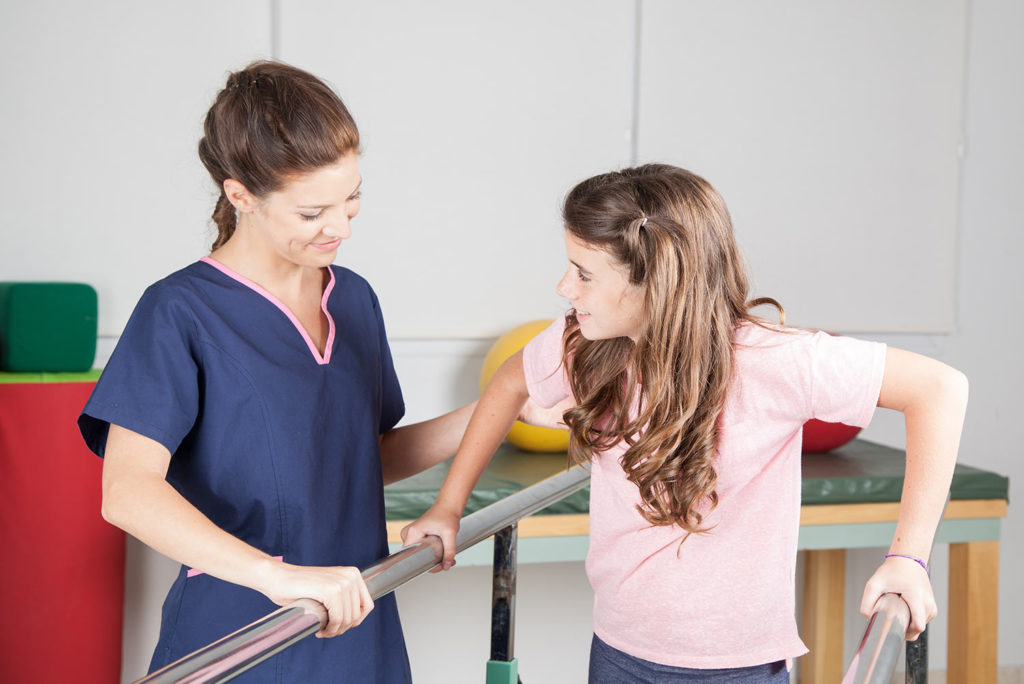During your treatment, there may be a few things that you can’t do, but you will find out soon that your orthopedic fixation device doesn’t interfere too much with your normal life. Your orthopedic surgeon will explain the schedule for adjustments, how to clean the pin sites, and will plan some visits to check how it’s going. Your doctor will give some instructions regarding weight bearing and mobility. At the beginning, you may need a wheelchair and/or crutches. Your physiotherapist will tell you how to use them. As soon as your fixation device is no longer needed, it will be removed easily, probably in an out-patient setting.
How will the fixation device affect my daily life?
Try to live your daily life as always: see friends, get out, do things you enjoy – this is very important for your treatment and successful recovery. It may be useful to plan ahead when visiting places, finding out, for instance, where the disabled access is, if toilets are accessible, and look for transports to get you there and back. A few things may only be more challenging with a fixator, some others are simply not allowed for your safety.
What is not recommended to do with a fixation device?
Driving a car. No driving is allowed until you can fully bear weight and you are relatively pain free. If your external fixator is on an upper limb, no driving is allowed if the external fixator bridges the wrist and/or you have a poor grip strength in either hand. Please ask your orthopedic surgeon and care team and discuss the possibility of driving with your insurance company.
Having sex without covering the fixation device. Your fixator frame should not stop you having normal relationships. You could cover the frame with a soft cloth to protect your partner’s skin.
Carrying items. It can be useful to use a cross body bag or a rucksack for carrying a bottle or other items. Some people attach a shopping bag onto walking frame handles.
Tight-fitting clothes. You may need to buy clothing a few sizes bigger than usual, choosing nice looking track pants with buttons and zips. Girls could also wear long, fashionable skirts. For ankle frames, there are special boots that are adjusted to fit the frame allowing for comfortable walking.
What is the fixator’s impact on sport and physical activity?
After surgery you will have limited motion and you won’t be allowed to bear weight for a certain number of days or weeks, according to your orthopedic surgeon and care team instructions. Nevertheless, nowadays teen patients tend to quickly return to independence and sports activities.
Here are some tips for your recovery:
Physiotherapy. Refer to your physiotherapist’s instructions regarding the quantity of physical activity and the type of exercises you should perform on a regular basis. Following his/her instructions is extremely important to ensure you get the maximum benefits of surgery and external fixation.
Swimming and hydrotherapy. Swimming in public pools, in the sea/ocean or in rivers should be avoided as any dirt or sand could increase the risk of infection. Hydrotherapy is fine as long as all your pin-sites are clean and healthy.
Stretching and strengthening exercises will ensure you can move the way you want to after the fixation device comes off and leaves you with improved energy.
Keep active. Go to the movies, eat out, attend your favorite sport matches and visit with family and friends. At the beginning, you may feel uncomfortable with people looking at your external fixator but try not to let it bother you and remember why you are doing this.
How can I talk about orthopedic treatment with my friends?
You should return to school as soon as possible once you are mobile, according to your surgeon and care team instructions. Show people – neighbors, friends, schoolmates and teachers – your orthopedic external fixator and explain to them how it works and why it is there. You could prepare your return to school by meeting your teachers in advance, sharing your feelings and concerns and telling them your special needs.
How to deal with my worries?
Talk to your parents and friends about your feelings and worries. Do not hide or ignore them. You should ask your orthopedic surgeon any question you have regarding your fixation device, your healing process and your future. Check with your surgeon and your care team to see if a psychological service is available in the hospital and seek for counselling if you feel the need for it.
 Share on facebook
Share on facebook
 Share on twitter
Share on twitter
 Share on linkedin
Share on linkedin
 Share on email
Share on email

